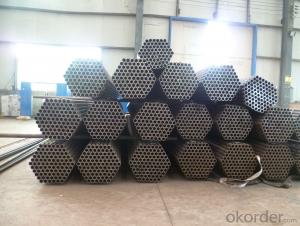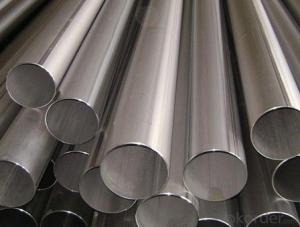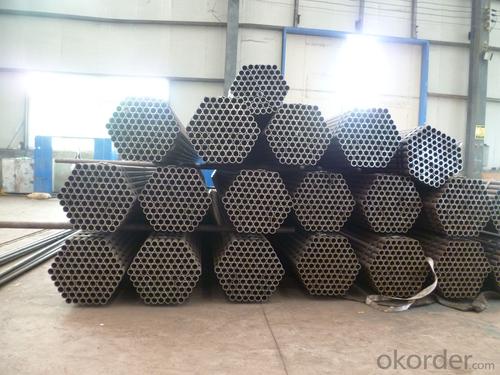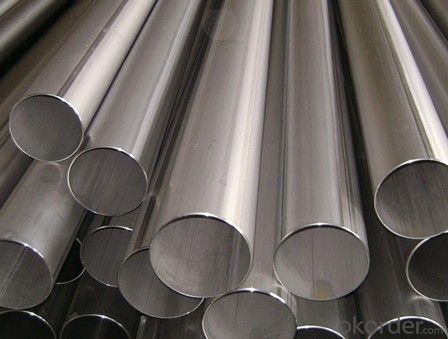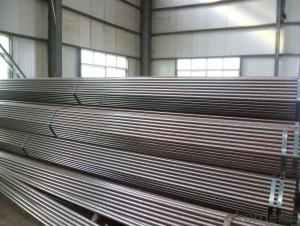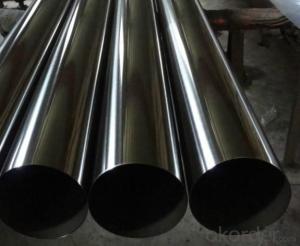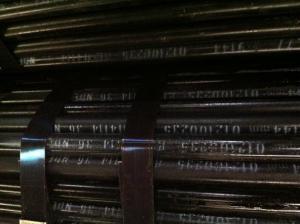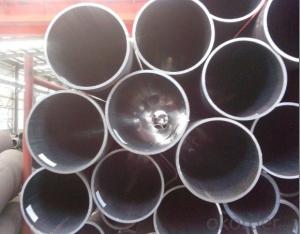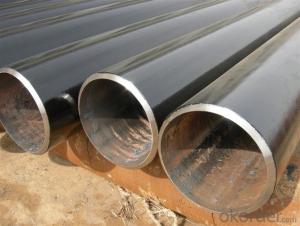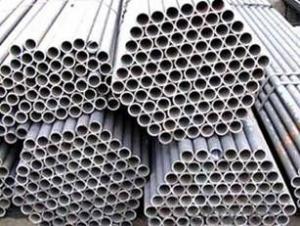Round Seamless Steel pipes
- Loading Port:
- China Main Port
- Payment Terms:
- TT or LC
- Min Order Qty:
- 25-35 m.t.
- Supply Capability:
- 3000吨 m.t./month
OKorder Service Pledge
OKorder Financial Service
You Might Also Like
Product Description
1. Commodity Name: Carbon Seamless steel pipe
2. Standard: API,GB,ASTM,ASME,DIN
3. Quality grade: 10#, 20#, A106B, A53B, API 5L B, Q235, Q345, ST37-2, ST 45, ST52.etc.
4. Dimension:
OD: 1/2"-24"
WT: 2.5-80mm, SCH10~SCH40~XXL
Length: 5.8m,6m,8m,9m,12m
5. Technique: Hot Rolled/Cold Rolled/ Cold Drawn
6. Application:
Carbon seamless steel pipes are widely used in gas, water and oil, transpotation;constructions;Bridge,highway,windows of model steel door; building materials;fences;heating facilities Fluid Pipe;conduit pipe,scaffolding pipe.etc.
7. Payment Terms: L/C D/A D/P T/T
8.packing and shipment
Packaged in bundles,as per customers' requirements, it can also bepackagesd as beveled ends, typed marking, black painting, plastic caps protection,woven bags packing
For 20" container the max length is 5.8m; For 40" container the max length is 12m. other options are available based on customer requests. Please discuss when placing orders.
Packaging & Delivery
Packaging Details: | seaworthy package,bundles wrapped with strong steel strip |
Delivery Detail: | 15-30days after received 30%TT |
Seamless Steel Tubes Image
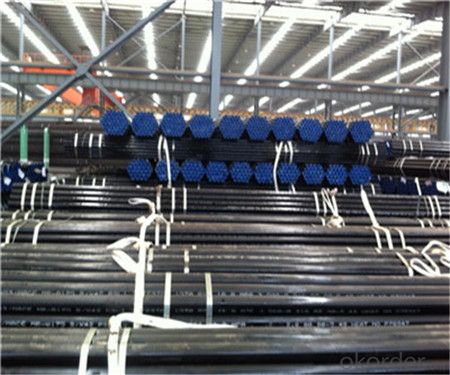
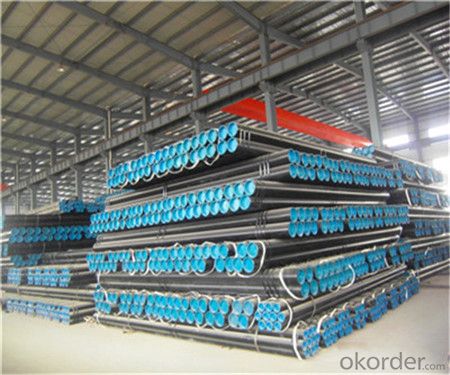
FAQ of Seamless Tube
①How is the quality of your products?
Our products are manufactured strictly according to national and internaional standard.
②How about price?
Yes, we are factory and be able to give you lowest price below market one,we quote as lowest as possible for any customer, and discount can be given according to quantity”.Please trust the quotation we would give you, it is professional one.
③Why should you chose us?
Chose happens because of quality, then price, We can give you both.Additionally, we can also offer professional products inquiry, products knowledge train(for agents), smooth goods delivery, exellent customer solution proposals.SGS test is available, customer inspection before shipping is welcome, third party inspection is no problem.
- Q: How are steel pipes insulated for thermal applications?
- Steel pipes are commonly insulated for thermal applications using various materials such as fiberglass, mineral wool, or foam insulation. These insulating materials are typically wrapped around the steel pipes to create a protective barrier that reduces heat transfer. Additionally, a vapor barrier may be installed to prevent moisture condensation. This insulation helps to maintain the desired temperature of the fluid or gas being transported through the pipes and prevents energy loss.
- Q: Can steel pipes be used for swimming pool installations?
- Yes, steel pipes can be used for swimming pool installations. Steel pipes are known for their durability and strength, making them a suitable choice for underground or aboveground swimming pool plumbing systems. They are capable of handling high water pressure and can withstand the corrosive effects of pool chemicals. Additionally, steel pipes are resistant to extreme weather conditions and can be easily installed and maintained. However, it is important to ensure that the steel pipes are properly treated and coated to prevent rust and corrosion.
- Q: Can steel pipes be used for automotive applications?
- Yes, steel pipes can be used for automotive applications. Steel pipes are commonly used for various automotive components such as exhaust systems, fuel lines, and structural frames due to their high strength, durability, and resistance to corrosion. They provide reliable performance and are cost-effective in automotive manufacturing.
- Q: Are steel pipes suitable for HVAC systems?
- Yes, steel pipes are suitable for HVAC systems. They are commonly used in HVAC installations due to their durability, strength, and resistance to high temperatures and pressures. Steel pipes also provide excellent corrosion resistance, making them ideal for long-term use in heating, ventilation, and air conditioning systems.
- Q: How are steel pipes used in the manufacturing of agricultural machinery?
- Steel pipes are commonly used in the manufacturing of agricultural machinery for various purposes such as structural support, fluid transportation, and hydraulic systems. They provide durability and strength to the machinery, allowing it to withstand the heavy loads and harsh conditions associated with agricultural activities. Additionally, steel pipes are often used to create the framework and chassis of the machinery, ensuring its stability and longevity in the field.
- Q: Can steel pipes handle extreme weather conditions?
- Steel pipes have a reputation for their capacity to withstand severe weather conditions. Steel, being a robust and durable material, can endure adverse environmental factors, including extreme temperatures, strong winds, heavy rainfall, and even catastrophic weather phenomena like hurricanes and tornadoes. The resilience and ability of steel pipes to withstand extreme weather conditions make them widely used in various industries and applications, such as water and sewage systems, oil and gas pipelines, and construction projects. Moreover, steel pipes can be coated or treated to enhance their resistance to corrosion, thereby further bolstering their ability to handle extreme weather conditions.
- Q: Are steel pipes suitable for use in food processing industries?
- Yes, steel pipes are suitable for use in food processing industries. Steel pipes are highly durable, resistant to corrosion, and can withstand high temperatures and pressures, making them ideal for transporting various food products and fluids. Additionally, steel pipes are easy to clean, maintain hygiene standards, and comply with food safety regulations, making them a reliable choice for the food processing industry.
- Q: What are the factors to consider when selecting the right steel pipe for a specific application?
- There are several factors to consider when choosing the appropriate steel pipe for a particular application. These factors encompass: 1. Compatibility with materials: Ensuring that the steel pipe is compatible with the substance it will transport or contain is crucial. Different materials may necessitate specific types of steel pipes to prevent corrosion or contamination. 2. Pressure and temperature requirements: The pressure and temperature conditions that the steel pipe will face should be taken into account. This will determine the necessary thickness and strength of the pipe to ensure it can withstand the intended operating conditions. 3. Size and dimensions: Selecting the size and dimensions of the steel pipe should be based on the flow rate, volume, and available installation space. It is vital to choose a pipe with the appropriate diameter and wall thickness to prevent flow restrictions or leaks. 4. Environmental conditions: The environment in which the steel pipe will be installed must be considered. Factors such as exposure to moisture, chemicals, or extreme temperatures may necessitate the use of specific coatings or materials to enhance the longevity and durability of the pipe. 5. Cost considerations: The cost of the steel pipe and its installation should be taken into account. Striking a balance between desired quality and available budget is essential to ensure the most cost-effective solution. 6. Regulatory compliance: Depending on the application, there may be specific industry regulations or standards that must be adhered to. Choosing a steel pipe that meets these requirements is important to ensure compliance and avoid any legal or safety issues. 7. Maintenance and lifespan: The maintenance requirements and expected lifespan of the steel pipe should also be considered. Some applications may require regular inspections or replacements, while others may require a more durable and long-lasting pipe. By carefully considering these factors, it is possible to select the appropriate steel pipe for a specific application that meets the desired performance, durability, and safety requirements.
- Q: How are steel pipes used in HVAC systems?
- Steel pipes are commonly used in HVAC systems for various purposes. They are used for transporting fluids such as water, steam, and refrigerant throughout the system. These pipes are durable and resistant to high temperatures and pressures, making them suitable for the demanding conditions of HVAC applications. They are used for distributing and circulating the heated or cooled air, as well as for connecting different components of the system, including boilers, chillers, heat exchangers, and air handlers. Additionally, steel pipes are often used for ventilation and exhaust purposes in HVAC systems.
- Q: How are steel pipes classified based on their wall thickness?
- Steel pipes are classified based on their wall thickness into three categories: standard weight, extra-strong, and double extra-strong.
Send your message to us
Round Seamless Steel pipes
- Loading Port:
- China Main Port
- Payment Terms:
- TT or LC
- Min Order Qty:
- 25-35 m.t.
- Supply Capability:
- 3000吨 m.t./month
OKorder Service Pledge
OKorder Financial Service
Similar products
Hot products
Hot Searches
Related keywords
